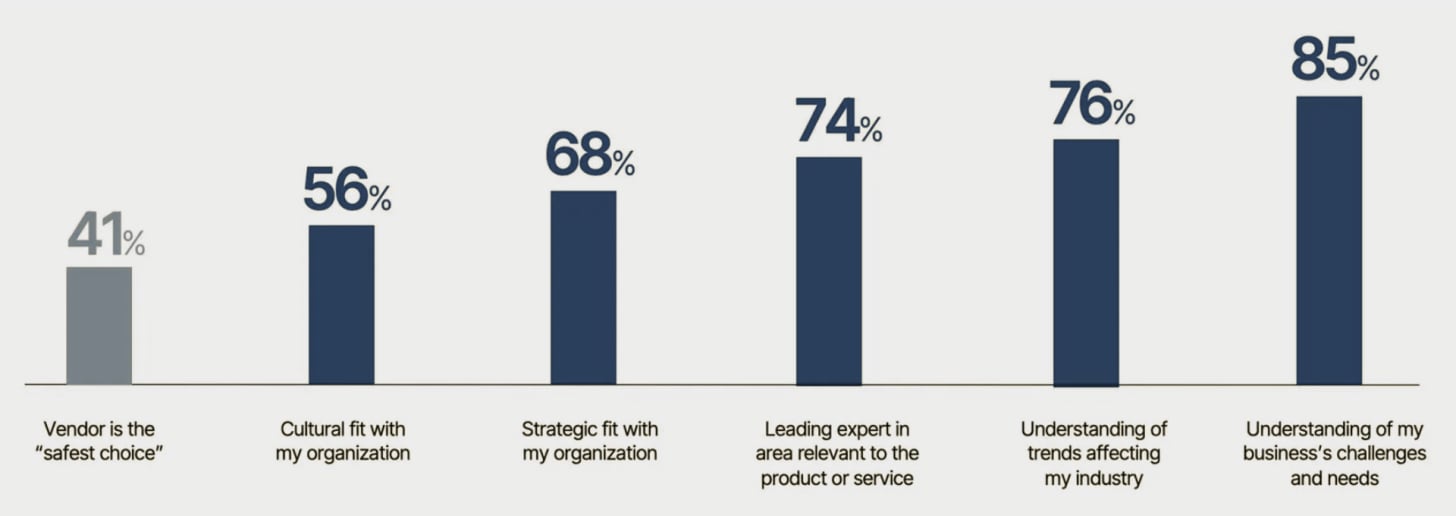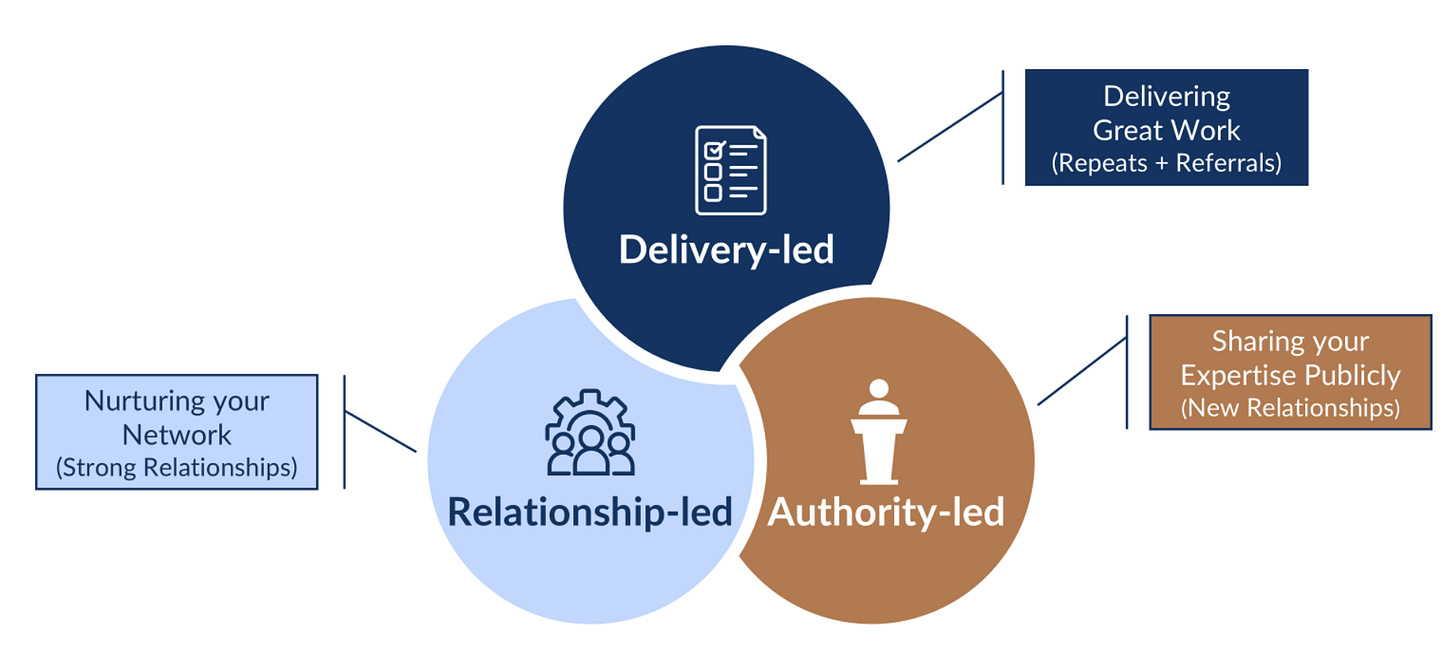Four Things We Can't Teach Consultants in a Workshop
The foundational skills that consulting leaders should be thinking about
Most of the time, when consulting leaders reach out to us, it’s because something is hurting right now. A skill gap that’s holding their team back. A behavioural pattern that’s creating risk with clients. A manager who’s just not quite stepping up.
And we’re glad to help. We’ve built our business around supporting those moments.
But occasionally, someone lifts their head above the day-to-day and asks a different kind of question:
“How do I build a really capable consulting team for the long term?”
When that happens, I know we’re in a different conversation.
Because yes, there are specific skills and tools that can help close short-term gaps. But there are also a small handful of capabilities that simply can’t be shortcut. No quick fix, no two-day workshop, no templated course will build them overnight.
And yet, they’re exactly the things that set great consultants apart. They’re the foundation of reputation, resilience and leadership. And they take years of attention and investment to grow.
It’s a big commitment for a consulting leadership team to develop and hold a long-term philosophy like this, but I’ve seen those who do reap the rewards.
So, how do I answer that question? I say, “You need to think about four things:
1. Deep Expertise
The biggest reason why clients choose you
Expertise might seem obvious. But we often underestimate just how much clients value it.
Recent research shows that 85% of buyers choose their consultant based on how well they understand their business’s challenges and needs. 76% said that understanding trends affecting their industry was one of the most important qualities. That’s far higher than brand reputation or cultural fit.

In other words, clients want to know they’re in safe hands. And increasingly, that means working with someone who knows their world — not just someone who’s smart and adaptable.
But deep expertise doesn’t arrive fully formed with a new hire. It’s shaped over years. Through project exposure, yes, but also through deliberate learning, structured insight, and reflective practice. It takes more than “learning on the job” to build real depth.
Actionable takeaway:
Treat expertise as something to be cultivated, not assumed. Create knowledge-sharing rhythms. Write internal briefings. Curate reading lists. Use client stories to bring the industry to life. The goal is to accelerate learning without skipping depth.
2. Strong Network
Where the next project usually begins
It’s easy to talk about networking as something for senior people. But the seeds of a strong network are planted early and they’re one of the most valuable long-term assets a consultant can build.
Referrals and repeat work are still the number one driver of growth for most consulting firms. But trust-based relationships take time. You can encourage them and create conditions for them, but you can’t rush them.
As the saying goes:
It takes a long time to grow an old friend. Trust is built one single moment at a time.
And it’s not about LinkedIn connections. It’s about real professional relationships. People who understand what you do, trust how you work, and remember how you made them feel.
Actionable takeaway:
Encourage your team to stay connected with clients, collaborators, and peers from past projects. Support them to build habits around staying in touch. Give them space to take someone for coffee, and permission to treat relationships as part of the job, not a distraction from it.
3. Visible Authority
How you get found by people you don’t know yet
Being an excellent consultant is essential. But, if no one beyond your immediate circle knows that, it limits your impact…and your firm’s growth.
Visible authority means being recognised outside your network. It’s what makes you discoverable, referable, and trusted before the first meeting. It’s what allows your firm to generate warm leads without having to push so hard behind the scenes.
But here’s the truth: it doesn’t happen through one-off posts or ‘thought leadership’ drives. It’s built over time by consistently sharing what you know, with clarity, generosity, and relevance to your audience.
Actionable takeaway:
Start small, start early. Encourage junior consultants to write, share, speak, reflect. Support them to publish LinkedIn posts, join panels, speak at conferences, or even start their own podcast. Over time, these contributions build both confidence and credibility.
These first three foundations speak directly to the three ways that consulting leaders can grow revenue: delivery-led, relationship-led, authority-led.
The fourth speaks to the foundational necessity for trust…
4. Self-Awareness and Behavioural Agility
The lynch pin for high performance
This is the hardest to pin down, but arguably the most transformative when well developed. Let’s consider the two parts of this one:
Self-awareness means understanding how you show up - your default patterns, the impact you have, the assumptions you carry.
There are many ways to gain self-awareness, both formally and informally. It can be effective to ‘jump-start’ the journey by using assessment tools such as Discovery Insights or Vertical Mindset Indicator to explore the dimensions of your personality. If you are interested in this, here is a link to our webinar: Consulting Personalities - Understanding yours and adapting to your client’s
Behavioural agility is the ability to flex those patterns with intention. To respond to the moment appropriately and consciously, not just react in line with your habits.
In consulting, this might mean shifting between different Consulting Archetypes - from analyst to storyteller, from expert to transformer. Those shifts don’t just happen. They require reflection, range, and a willingness to look at yourself closely. I introduced this concept in a recent article: The 8 Consulting Archetypes - Your Map to Consulting Mastery and Client Success.
For many consultants, this sort of work starts late, if at all. But for those who discover it early it can become a superpower.
Actionable takeaway:
Begin with reflection tools: personality profiling, archetype models, mindset conversations. Encourage your team to talk openly about how they think, what they notice, and how they handle stress or ambiguity. Consider the feedback culture in your firm and look for ways to improve the quality and frequency of feedback shared between colleagues. Over time, these conversations unlock range and real growth.
None of these four capabilities are quick wins. But they are absolutely foundational if you want your team to thrive in the long term. It’s not every leader who lifts their head from the day-to-day firefighting to consider long-term capability building, but I’ve seen first-hand that it pays dividends for the ones who do.
So, a quick reminder of the four areas of focus:
Deep expertise to build confidence and trust.
Strong network to bring work and develop reputation.
Visible authority to open new doors.
Self-awareness and agility to turbo charge all-round effectiveness.
And the key takeaway? If you wait until someone’s about to make Partner to start developing these things, it’s too late. Begin early and you’re laying the foundations for something strong.
As ever, if you want to chat about what this may mean for your team, please find a time to do so: Book an intro chat here.
Thank you for reading The Skilled Consultant. If you haven’t yet subscribed, please do so to receive all our articles direct to your inbox.
There are several other ways you can interact with Honeycomb Consulting Skills Training….
Connect with Deri Hughes (Founder & MD) on LinkedIn
Connect with Colin Mann (MD) on LinkedIn
Book a 30 minute intro call with Deri Hughes
Stay informed about our free workshops and webinars - follow Honeycomb on LinkedIn or visit our website.






